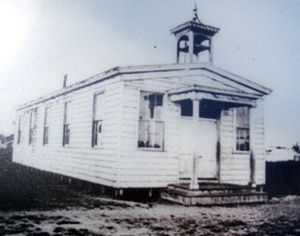Hilton Head Island, South Carolina, solidly under the control of the United States military, is the Union’s southern headquarters for the war and a major military supply depot. Fort Howell, a hospital, barracks, and other structures support a force that at times exceeds 30,000 men. Strategically, the island is staging grounds and supply headquarters for the blockades of Savannah and Charleston. Collaterally, the island is now home to a thousand or more former African slaves, individuals who obtained their freedom directly or indirectly because of the presence of the Union Army (many are escapees who fled behind Union lines, and their numbers continue to grow).
Since the Union occupation in early 1862, black Baptists had been meeting for Sunday worship services on Hilton Head Island. In August, the first church on the island was formed, a Baptist congregation. A newspaper account describes the congregation’s Sunday meetings:
Their meetings are held twice or three times on Sundays, also on the evenings of Tuesday, Thursday, and Friday. They are conducted with fervent devotion by themselves alone, or in the presence of a white clergyman when the services of one are procurable. They close with what is called a “glory shout” one joining hands with another, together in couples singing a verse and beating time with the foot.
The presence of a large number of freedmen, however, has caused no small problems. Not all Union soldiers are appreciative of the blacks in their midst, while at the same time freedmen are at a loss as to how to support themselves. As a result, attempts to establish Negro camps within Union lines do not work satisfactorily, and changes are sorely needed.
Hence, a new solution is envisioned and implemented by Maj. Gen. Ormsby M. Mitchel, Commander of the Department of the South headquartered at Hilton Head. Mitchel creates a freedmen town, later named Mitchelville, located on an former plantation and near Union military forces, complete with systematic streets, quarter acre lots, a church, elected officials, taxes, compulsory education for children (the teachers are Northern missionaries, many of whom are Baptists), and typical laws governing townships. His creation is likely the first of its kind in the South, and is a far cry from the haphazard contraband (freemen) camps within Union lines.
Mitchelville’s initial church is the August-founded First Baptist Church, a nod to the popularity of the Baptist faith among blacks. During the war years and following, the church prospers, becoming known as the First African Baptist Church of Hilton Head Island and fathering five other Baptist congregations. In the larger picture, the Mitchelville / First African Baptist Church becomes symbolic of the historic spiritual life of South Carolina’s coastal black residents, later to be known as the Gullah Geechee people.
Sources: “Mitchelville” (link); “Hilton Head Island’s Mitchelville: the first freedmen town in the South,” including photograph (link); “Hilton Head Island Church Celebrates 150th Anniversary,” WTOC, August 19, 2012 (link); “Gullah Geechee Culture,” Gullah Geechee Cultural Heritage Corridor (link)



